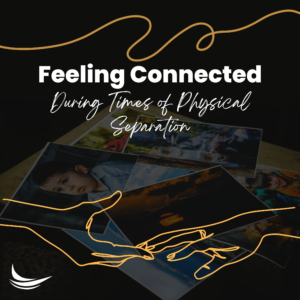 It can be hard to feel like you are still connected when physically separated from loved ones. Finding ways to feel connected even during physical distance can help aid in coping.
It can be hard to feel like you are still connected when physically separated from loved ones. Finding ways to feel connected even during physical distance can help aid in coping.
If you or your child have been impacted by any of the following, keep reading for strategies on how to maintain a sense of connectedness —
- Participation in residential or intensive outpatient mental health or substance use treatment.
- Military deployment or jobs requiring extensive travel.
- Separation or break from a long-term relationship with an intimate partner.
- Deportation of a loved one.
- Changing schools or moving—no longer having contact with significant adults or peers.
- Temporary or permanent changes in living situation or custody arrangement.
- Incarceration of a loved one.
- Inconsistent parental or relational involvement from a primary figure.
- Hospitalization and coping with implications of chronic medical conditions.
- Saying goodbye to a significant relational figure due to termination or loss of the relationship.
For children, having adult support and opportunities to ask questions is important For parents, it can be difficult to know how much information to share and how to share it. One of my favorite strategies as a therapist is incorporating resources such as storybooks that beautifully communicate and illustrate difficult messages.
One book that does an excellent job of doing so is The book “The Invisible String” by Patrice Karst. One of the quotes in the book says, “People who love each other are always connected by a very special string made of love.” Books can help build upon existing strengths and communicate messages of hope. I really love the visual of an “invisible string” as this example can be explained to young children but also is related to older children and adults. As with all interventions, if there are parts that do not align with your personal beliefs or values, these can be skipped over or customized with language that fits your situation.
The concept of the invisible string can be incorporated as an intervention for children who struggle with separation anxiety disorder and have difficulties sleeping alone at night. It is possible to feel a shared connection of love, even when physically separated…not being able to see someone yet still feeling loved and connected.
Tangible items such as photos, letters, or mementos can help both children and adults feel connected when they are not able to communicate through methods such as text, phone calls, or video chat. Having a supportive space in therapy to process thoughts, feelings, and experiences related to these types of situations can help build resiliency and coping. It is helpful to have conversations about the important people in your or your child’s life. It can be comforting to be reminded that we are all interconnected.
Written By: Charlotte Johnson, MA, LPCC
We’re Here to help
Our wellness experts will be happy to take care of you. You can CLICK HERE to schedule an appointment now or call (612)223-8898.
Meet Clinicians
We’re united by our commitment to providing effective, relevant, and innovative mental health support at all stages of your journey. Click Here to find a therapist or find out more about who we are, where we come from, and how we live out CARE’s mission every day.
The professionals at CARE are actively collecting and creating resources to help with what you need and address frequently asked questions. We’re Here for You.



